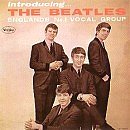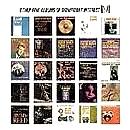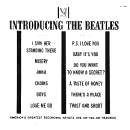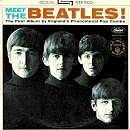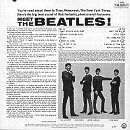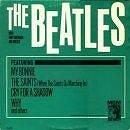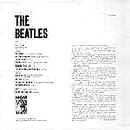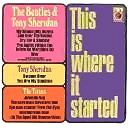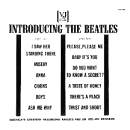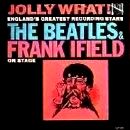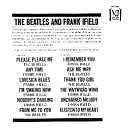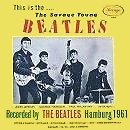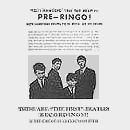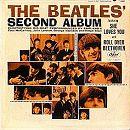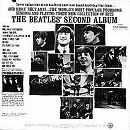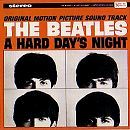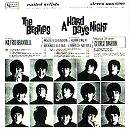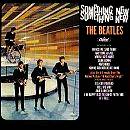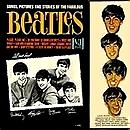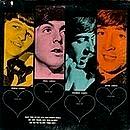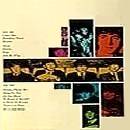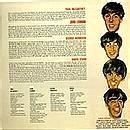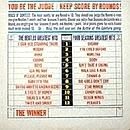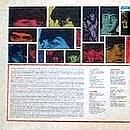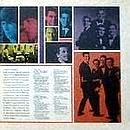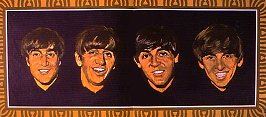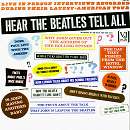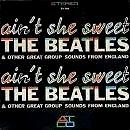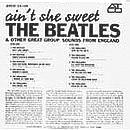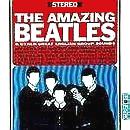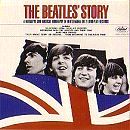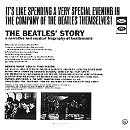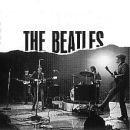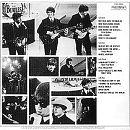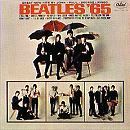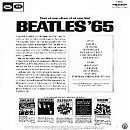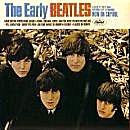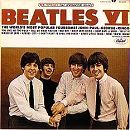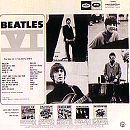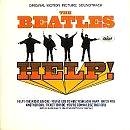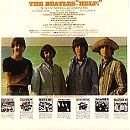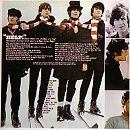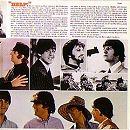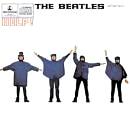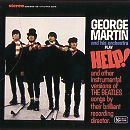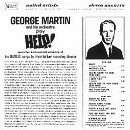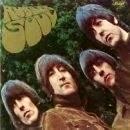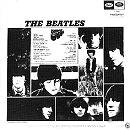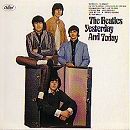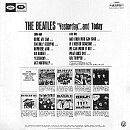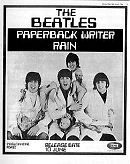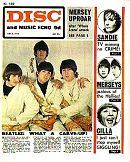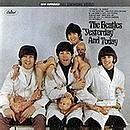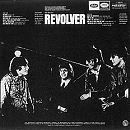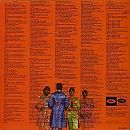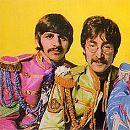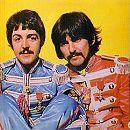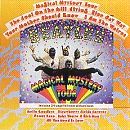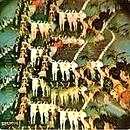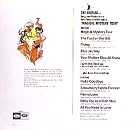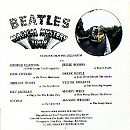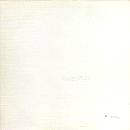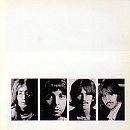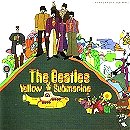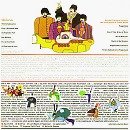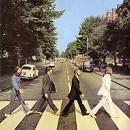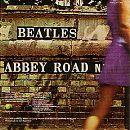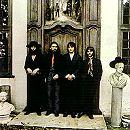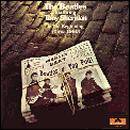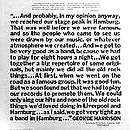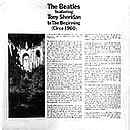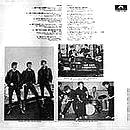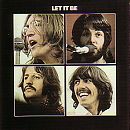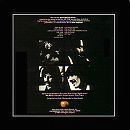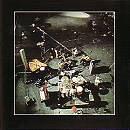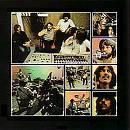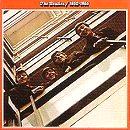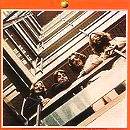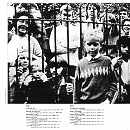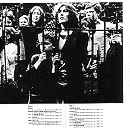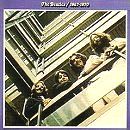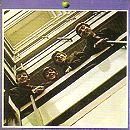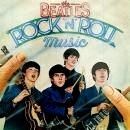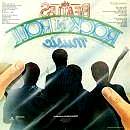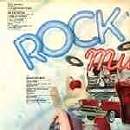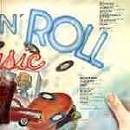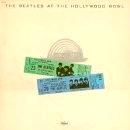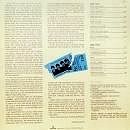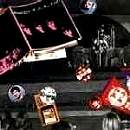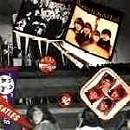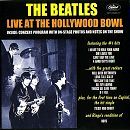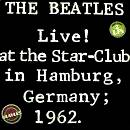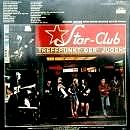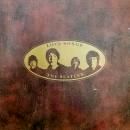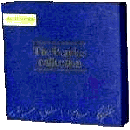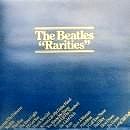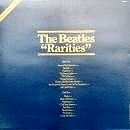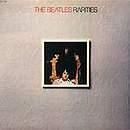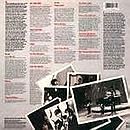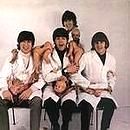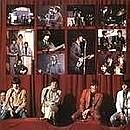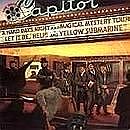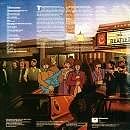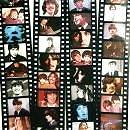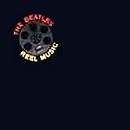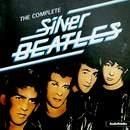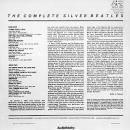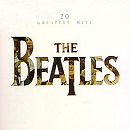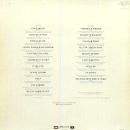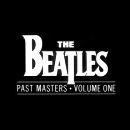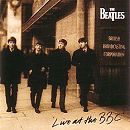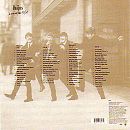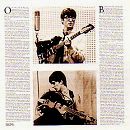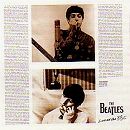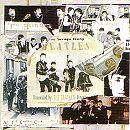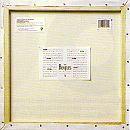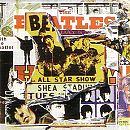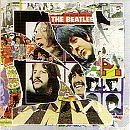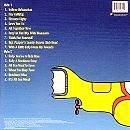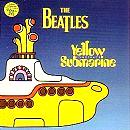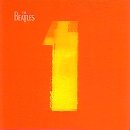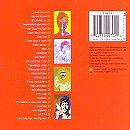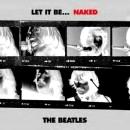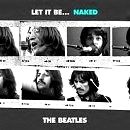 |
||||||||||||||||||||||||||||||||||||||||||||||||||||||||||||||||||||||||||||||||||||||||||||||||||||||||||||||||||||||||||||||||||||||||||||||||||
Introducing The Beatles(Vee-Jay VJLP 1062 MONO / S 1062 STEREO) Side A: I Saw Her Standing There / Misery /
Anna (Go To Him) / Chains / Boys / Love Me Do
When Capitol refused to take up their option on the Beatles, Brian was forced to hand their debut album over to Vee-Jay - a little company with an even littler budget. In Britain it was called Please Please Me and contained fourteen songs. But a standard LP in America only had twelve, so they knocked out 'Please Please Me' and 'Ask Me Why' - those two songs had already formed their debut single in February '63 (which bombed) so there was little point in using them again. And with 'Please Please Me' missing, there was no need to keep the British title, so they re-christened it Introducing The Beatles. The cover was a disaster from start to finish... The front wasn't tooo bad - they used the photo from the The Beatles' Hits EP, chopped off their feet and reversed the negative - meaning their hair was flowing the wrong way! But the back became one of the most confusing covers in history. There are actually three different versions of it. The first one is called the 'ad-back', for obvious reasons - it contained photos of Vee-Jay's forthcoming releases. But the story behind it answers a common mistake that Beatles' books often make: most discographies list the release date as 22nd July 1963. That is wrong! Vee-Jay certainly had plans to press it up in the summer, but financial restraints led them to scrap it before Christmas. They actually had to sack their president for mishandling the company's funds. They couldn't afford to pay royalties to their artists, and Transglobal (who licensed the Beatles in the States) took them to court. The result was that Vee-Jay ceased producing Beatles records in August '63. Brian was galled to find that Vee-Jay had no plans to release any more Beatles product ever. The only things that they had released up to that date were their first two singles - which had both bombed. So it came as no surprise when the Beatles failed to make the Christmas ad-back.
the blank-back
the titles-back Things rapidly changed after Christmas, however, because Capitol scored a massive hit with 'I Want To Hold Your Hand'. They had belatedly decided to take up their option after seeing Beatlemania sweep the UK. This put Vee-Jay in a bit of a bind. Because according to their lawyers, the only songs that they still held the copyright on were the four songs on the singles. Because the album had never actually been released, they no longer had a claim on the material! As you can imagine, this pissed them off big-time, because they were sitting on a goldmine. To make matters even worse, Transglobal advised them that the Beatles' first UK single had been handled by a different publisher, so they definitely didn't have the rights to 'Love Me Do' and 'P.S. I Love You'. But the Vee-Jay execs decided to go ahead and release the album anyway - the prize was too big to pass up. Many books claim that the ad-back was sneaked out in November, as a crafty way of keeping the song-set secret. But Bruce Spizer, in his excellent book The Beatles Records On Vee-Jay, has shown that this is wrong. The album didn't hit the shops until New Year. The ad-back came about because Vee-Jay never got around to writing linear notes, and were no longer in a position to ask for them; because as soon as EMI caught wind of Vee-Jay's LP they would have been straight back in court. Vee-Jay's stock of ad-backs didn't last forever however, and such was their precarious financial state, they couldn't afford to halt the run whilst more were printed up. This is where the second cover comes in - they simply used a 'blank-back' instead. The third back, called the 'titles-back' contained the song names and disc information, and was the last to be issued. The gravy-train hit the buffers on the 15th, when Capitol took them to court. Ardmore & Beechwood jumped on board as well, and sued them for using 'Love Me Do' and 'P.S. I Love You'. (The story continues below...) [N.B.: If you ever find a stereo copy of Introducing The Beatles with the ad-back, then quit your job - you're going to be rich!] Highest chart position: Billboard) didn't enter; Cashbox) didn't enter; Record World) didn't enter US sales figures: after 1 month - between 80,000 and 90,000
Meet The Beatles!(Capitol T 2047 MONO / ST 2047 STEREO) Side A: I Want To Hold Your Hand / I Saw Her
Standing There / This Boy / It Won't Be Long / All I've Got To Do / All
My Loving
Capitol released this a few days after 'I Want To Hold Your Hand' came out, and just in time too - because America was on the verge of going nuts. The Singing Nun had been inflicting musical misery on the nation for ten straight weeks before the Fabs came along. They ended up shifting three quarters of a million copies inside the first seven days, and five million by Christmas '66. The stiffest competition they faced all month was... themselves, with Introducing The Beatles at number two. The only band capable of knocking themselves off the top spot were... themselves, with The Beatles' Second Album in April '64. Prior to this album coming out, the music industry was geared to selling singles, and it was extremely rare for an LP to outsell a big hit. (Elvis had a couple of albums that topped a million, but no more than that.) But when Billboard reported in March that sales of Meet The Beatles! had risen to three and a half million in a few short months (outselling 'I Want To Hold Your Hand' by 100,000 copies) the tide started turning. Capitol certainly played their part because, unlike in Britain, they had nothing against shifting the disc with mega-selling singles. The British equivalent of Meet The Beatles! - With The Beatles, had missed out all of their number one records, because George Martin felt that it was unfair on the kids to stump up twice. “Brian and I were determined to give the buying public good value for money,” he said. “We had agreed that if a song had been released as a hit single, we should try not to use it as a cynical sales-getter on a subsequent album. To our way of thinking, this was asking people to pay twice for the same material.” But Capitol had no such qualms, and dumped a couple of songs to make way for their number one hit I Want To Hold Your Hand b/w I Saw Her Standing There. [N.B.: Despite Martin's noble intentions in 1964, his quote backfired somewhat because Please Please Me, A Hard Day's Night, Help!, Revolver, Yellow Submarine, Abbey Road and Let It Be all ended up with songs that had been used, or were later used on singles. The Rolling Stones were much better in this regard, and didn't release a studio album with singles until Aftermath came out.] There was another factor in play as well - the Beatles' American LPs typically consisted of just twelve songs, compared with the fourteen on the Beatles' British versions. That's because the royalties were worked out in a different way in the States. In the UK, the royalty is paid as a share of the whole, but Americans calculated it based on the number of songs appearing - so the rate went up every time another song was added. This inevitably led to Capitol shortening the set. The decision was taken to dump the five cover versions, on the grounds that the kids would have already heard the originals. (Ironically, 'Roll Over Beethoven' was then released as a single in Canada and became so popular that the dealers started shipping them into the States - forcing Capitol to give it a prominent place on the follow-up!) Capitol's culling of the song-set continued throughout the mid-sixties, and they frequently ended up with spare songs to shift as singles or, in a couple of cases, as whole extra albums. For every two albums that The Beatles released in the UK, Capitol managed to squeeze out three. (This led to a few peculiarities in the history books. For example, in 1964 they had fourteen songs in the Hot 100 - despite having only released six singles. And they also had three albums in the Billboard's album chart, when they'd only recorded two!) When EMI finally released the albums on CD in 1987, they used the British albums as the global standard. The only American album to retain it's place was Magical Mystery Tour. The Americans also subjected the first few Beatles' albums to some heavy-handed editing. Stereo records were much more popular in America than they were in Britain, so Capitol felt obliged to stick them out in stereo. But instead of waiting for EMI to ship over the true-stereo masters, they just took the mono recordings and re-panned all of the bass frequencies over to the left channel, and moved the treble-end to the right. This was called 'fake-stereo'. The result was that virtually all of the early American songs sounded significantly different to their British counterparts. (The most badly affected song is 'You Can't Do That' on A Hard Day's Night, which, according to William McCoy, sounds like John is singing inside a cardboard box.) Highest chart position: Billboard) #1;
Cashbox) #1; Record World) #1 US sales figures: after 2 months - 3,650,000;
to date - over 5 million
The Beatles With Tony Sheridan And Guests(MGM E 4215 MONO / SE 4215 STEREO) Side A: My Bonnie / Cry For A Shadow /
Swanee River / The Darktown Strutter's Ball
the re-release cover As soon as the Beatles hit the big-time, German Polydor licensed the Tony Sheridan session to two American companies - MGM and Atlantic. And much to Brian Epstein's disgust, they recycled the eight short songs on four different singles and five separate albums. But the Beatles had already signed away the royalties back in 1961 so they got nothing back! This LP contained five songs with the Beatles and one by Tony. The other four instrumentals were by an American group called The Titans. In August 1966 the album was re-released as This Is Where It Started, minus two of the Titan songs - 'Flying Beat' and 'Happy New Years Beat'. Highest chart position: Billboard) #68;
Cashbox) #43; Record World) didn't enter
Introducing The Beatles(Vee-Jay VJLP 1062 MONO / S 1062 STEREO) Side A: I Saw Her Standing There / Misery /
Anna (Go To Him) / Chains / Boys / Ask Me Why During their January court case, Vee-Jay were dismayed to find that the Beatles' first UK single, Love Me Do b/w P.S. I Love You, was published by Beechwood (the American arm of Ardmore & Beechwood) - the owners of which were Capitol! So Capitol used that as a bludgeon in the unfolding drama. They instructed Beechwood to deny the rights to Vee-Jay, and after a month or so of legal argument they were forced to re-release the album with a different song-set. They replaced both songs with their debut single in the States - Please Please Me b/w Ask Me Why. The album was kept off the top spot by Meet The Beatles!. Highest chart position: Billboard) #2;
Cashbox) #2; Record World) #1 US sales figures: after 2 months - 945,000; after 5 months - 1¼ million; to date - 1,345,000
Jolly What! England's Greatest Recording Stars The Beatles & Frank Ifield On Stage(Vee-Jay VJLP 1085 MONO / S 1085 STEREO) Side A: Please Please Me / Any Time [Frank
Ifield] / Lovesick Blues [Frank Ifield] / I'm Smiling Now [Frank Ifield]
/ Nobody's Darling [Frank Ifield] / From Me To You By early '64, the only songs that Vee-Jay knew they held the rights to were the four songs on the singles (Please Please Me, Ask Me Why, From Me To You and Thank You Girl). The other ones were still mired in legal chit-chat. So the race was on to sell them again, before the Beatles' bubble burst. But the only way they could think of doing it (other than re-releasing the singles - which they also did) was to combine them with another one of their British acts - Frank Ifield. So the album ended up with eight songs by Frank, and four by the Beatles - a complete waste of anyone's money. So in order to spruce it up a bit they said that it was live “on stage”, but that was a blatant lie! All of the songs were studio recordings. (The concert that it was supposed to refer to was held in Peterborough on the 2nd December 1962, when the Beatles went down like lead balloons. Most of the kids had turned up to watch old-Frankie, who was having a run on chart hits at the time.)
the replacement cover Like most of Vee-Jay's sleeves, the cover has caused us considerable confusion down the years. That's because there are actually two covers for the same LP. The first one features a country gent in Beatles wig, with the absurd title Jolly What! England's Greatest Recording Stars The Beatles & Frank Ifield On Stage, but that was replaced in September '64 with the blue painting (copied from the 'Love Me Do' single). This was done to get a bit more mileage out of the old LP. They had already repackaged the singles as 'oldies', and Introducing The Beatles as Songs, Pictures And Stories - so the only record without a second issue was this one. The Capitol court-case had denied them the right of fiddling with the song-set, so the only thing left to do was put it out in a brand new box. They also ditched the stupid title, and relegated Frank to the sleeve notes - the cover just listed the Beatles' songs. But it only sold a few thousand copies (making it one of the rarest discs for Beatles collectors). The sleeve notes also contain one of the worst spelling mistakes in Beatles history. Because it signs off by saying: “It is with a good deal of pride and pleasure that this copulation (sic) has been presented.” But Bruce Spizer has since found out that this 'orgasmic musical marriage' was an integral part of the prose. Highest chart position: Billboard) #104;
Cashbox) #73; Record World) didn't enter US sales figures: 28,000 (includes 3,000 with the replacement cover)
The Savage Young Beatles(Savage BM 69) Side A: Cry For A Shadow / Let's Dance / If
You Love Me, Baby / What'd I Say
This dubious album (it is not clear whether Savage had the rights to release the songs) has the distinction of being the only Hamburg album to correctly credit Pete Best on the drums. All of the other companies tried to pass it off as current material. Unfortunately, they then rather ruined it by trying to pass off the Tony Sheridan songs as Beatles recordings! Four of the set (Let's Dance, What'd I Say, Ruby Baby and Ya-Ya) were later additions by Tony that didn't feature the Beatles at all. You might notice that the picture on the front also graces the Anthology 1 LP - but they ripped Pete's head off so they could fit Ringo in.
The Beatles' Second Album(Capitol T 2080 MONO / ST 2080 STEREO) Side A: Roll Over Beethoven / Thank You
Girl / You Really Got A Hold On Me / Devil In Her Heart / Money
(That's What I Want) / You Can't Do That
This became Capitol's fastest-selling LP, shifting well over 250,000 copies in twenty-four hours. It quickly overtook Vee-Jay's Introducing The Beatles and the Beatles' real second album, Meet The Beatles!, and sat on top of the tree for five weeks. They also became the first-ever act to knock themselves off the top spot. Capitol decided to reduce the song-set to eleven this time around (to save themselves $20,000 on royalty rates for every million copies sold), and played merry havoc with the running order. It doesn't really bear relation to any of the British LPs. It includes all five of the cover versions dumped from Meet The Beatles!, and both sides of their number one hit 'She Loves You'. It also includes a couple of numbers that ended up on the Long Tall Sally EP - 'Long Tall Sally' and 'I Call Your Name'. These last two songs received their American debut a full two months before the British kids got to hear them. Highest chart position: Billboard) #1;
Cashbox) #1; Record World) #1 US sales figures: over 2 million
A Hard Day's Night(United Artists UAL 3366 MONO / UAS 6366
STEREO) Side A: A Hard Day's Night / Tell Me Why /
I'll Cry Instead / [I Should Have Known Better - instrumental by the
George Martin Orchestra] / I'm Happy Just To Dance With You / [And I
Love Her - instrumental by the George Martin Orchestra] The US version of A Hard Day's Night is different from the UK's version because it only contains the songs in the film, plus some George Martin instrumentals from the soundtrack. There is a long and convoluted story behind this release, and it's best described below.... Highest chart position: Billboard) #1;
Cashbox) #1; Record World) #1 US sales figures: after 4 days - over 1 million; after 4 months - over 2 million
Something New(Capitol T 2108 MONO / ST 2108 STEREO) Side A: I'll Cry Instead / Things We Said
Today / Any Time At All / When I Get Home / Slow Down / Matchbox
You may have noticed that the previous release - A Hard Day's Night, was a United Artists album. Something New can best be described as Capitol's version of that album. When the movie came out in '64, Capitol found themselves in a bit of an embarrassing situation. Because when the film was mooted around in October '63, the Capitol big wigs were still unmoved by the Beatles' product. And they weren't the only ones either - because Vee-Jay were on the verge of dropping them as well, because all of their singles had flopped out of sight and they couldn't afford to do anymore. And the very last thing that Capitol wanted was a soundtrack to a movie by some shit-arse band that no one liked. So EMI sold the rights over to the film's producer - United Artists. (The rights to the British soundtrack stayed with EMI, of course.) But when the premiere came round in '64, all fuckin' hell broke loose. Beatlemania was in full swing and Capitol were kicking themselves. But they had a plan. UA could only sell the songs in the movie (...hence the George Martin instrumentals), but Capitol had the rights to every Beatles song in the States. So there was nothing stopping them releasing them as singles and album tracks! (They just couldn't market it as a soundtrack.) So they quickly put together an LP and sold six of the seven songs as singles. UA fought back, however, and got their soundtrack in the shops two months before the movie. And it literally flew off the shelves! It sold by the absolute bucket-load - much to Capitol's disgust. They had to sit and suffer whilst every kid in America went out and bought a copy. The big-wigs quickly realised that they wouldn't make any money selling an identical LP, so they removed a few of the movie songs and stuck on some new ones from the Long Tall Sally sessions. They then renamed the whole thing Something New and upped the release date by two weeks. The album went on to sell over two million copies. But UA had the last laugh, because A Hard Day's Night kept Something New at the number two position for three whole months. The album cover shows their appearance on The Ed Sullivan Show in February '64, and the production credits list “Produced in England by George Martin and in the USA with the assistance of Dave Dextor, Jr.” Now, clever readers will recognise that name. Because 'deaf-man' Dextor was the guy who turned down their first four singles! And here he was taking the credit for their music! What a hypocrite! He produced absolutely nothing on this LP - his sole contribution was working out the running order. Highest chart position: Billboard) #2;
Cashbox) #2; Record World) #2 US sales figures: over 2 million
Songs, Pictures And Stories Of The Fabulous Beatles(Vee-Jay VJ 1092) Side A: I Saw Her Standing There / Misery
/ Anna (Go To Him) / Chains / Boys / Ask Me Why Yet another attempt by Vee-Jay to cash-in on their back catalogue. This was just a repackaged version of Introducing The Beatles, with a fold-out cover, photos and biographies. And they didn't even bother to reprint the record labels. It caused them considerable problems in court (again) because as soon as Capitol caught wind of their new release, they sued them. The settlement reached in January '64 expressly forbade them from releasing a new set of songs. But Vee-Jay got around the ban by releasing the same set of songs in a brand new cover. Sneaky! The front cover featured the same Dezo Hoffmann photo that was used on the 'I Want To Hold Your Hand' single, and the drawings on the side were copied from the 'Do You Want To Know A Secret' single and Souvenir EP. Highest chart position: Billboard) #63;
Cashbox) #100; Record World) #79 US sales figures: 391,525
The Beatles Vs The Four Seasons(Vee-Jay VJ DX-30) Side A: I Saw Her Standing There / Misery /
Anna (Go To Him) / Chains / Boys / Ask Me Why Another cynical marketing ploy by Vee-Jay to gain a bit more mileage out of their back catalogue. Their licence to release Beatles' songs was due to run out at the end of October, so they started re-releasing everything they had in different packages. This one was a combination Introducing The Beatles and the Four Seasons' Golden Hits. The punters were then invited to vote for the 'winner'. It also came with scorecards and photos (the biographies were lifted straight from the Songs, Pictures And Stories LP). Not content with fucking up the Beatles' contract, Vee-Jay had also managed to bugger up the Four Seasons' one too. They initially signed them up in '63 with tremendous success - they became the first band in the history of the Billboard chart to open their account with three number one singles (Sherry, Big Girls Don't Cry and Walk Like A Man), but money worries in the summer meant that they couldn't afford to keep up their royalty payments. This led to the Four Seasons leaving Vee-Jay, and signing with Philips instead. Vee-Jay, however, retained the rights to all of their old songs - hence this LP. It was an ideal way to kill two birds with one stone - release one album by two mega-selling bands. Their original idea was to release a just single set of songs - half Beatles and half Four Seasons. But the deal hammered out in the court-case forbade them from releasing a new set of Beatles' songs - they could only release the same set of songs listed on their debut LP. Vee-Jay sent a begging letter to EMI, outlining their position, but got a firm 'no' back. So they simply repackaged the Beatles' original disc with the Four Seasons' Golden Hits, and gave it a brand new name! This was the last of Vee-Jay's re-releases, which meant that they had now sold the same songs on four different LPs. It also gave rise to a few amusing bootlegs, like: The Beatles Vs Chuck Berry; The Beatles Vs Buddy Holly, and The Beatles Vs Little Richard And Larry Williams. Highest chart position: Billboard) #142; Cashbox) didn't enter; Record World) didn't enter US sales figures: 19,425
Vee-Jay scrapes the bottom of the barrel... Vee-Jay's right to release Beatles' records expired on the 15th October 1964, but that didn't stop them releasing Beatles albums. Far from it... If they couldn't use Beatles songs anymore, then they'd just get someone else to sing 'em! In the summer of '64 (date unknown) they released The 15 Greatest Songs Of The Beatles which had three pictures on the front. Ringo is missing because he didn't write any of the songs. A careful perusal of the cover reveals that all of fifteen songs are performed by The Merseyboys. The second one came out in early November
'64 and was called Hear The Beatles Tell All - an album full of
Dave Hull interviews. It sold a respectable 21,000 copies.
Ain't She Sweet(Atco SD 33-169) Side A: Ain't She Sweet / Sweet Georgia
Brown [With Tony Sheridan] / Take Out Some Insurance On Me, Baby [With
Tony Sheridan] / Nobody's Child [With Tony Sheridan] / I Wanna Be Your
Man [Performed by The Swallows] / She Loves You [Performed by The
Swallows]
the re-release cover This was just some songs taken from the Tony Sheridan session. The only song that is pure Beatles (albeit, with Pete Best on the drums) is the title track. And then there's another eight songs by an 'English' group (who were actually American) called The Swallows. The album was rushed out to cash-in on the surprise success of the single 'Ain't She Sweet', which managed to make number 19 in the singles chart. But needless to say, the public didn't bother buying it and it didn't make the chart. A couple of years later they re-released it as The Amazing Beatles And Other Great English Group Sounds with a brand new cover, and - just to make it even worse than it already was - removed a couple of the Swallows' songs as well ('How Do You Do It?' and 'I'll Keep You Satisfied'). Unsurprisingly, that one also failed to chart. Highest chart position: Billboard) didn't enter; Cashbox) didn't enter; Record World) didn't enter
The Beatles' Story(Capitol TBO 2222 MONO / STBO 2222 STEREO) Side A: 'On Stage With The Beatles', 'How
Beatlemania Began', 'Beatlemania In Action', 'Man Behind The Beatles -
Brian Epstein', 'John Lennon' with extracts from the following songs - I
Want To Hold Your Hand / Slow Down / This Boy This was released to celebrate the first anniversary of 'I Want To Hold Your Hand' entering the American charts. Sales were dented somewhat by the hefty price tag - Capitol charged $8 for a mono copy and $10 for a stereo (double the cost of a normal LP). But it still managed to sell a million inside six months. The double LP was filled with snippets of songs, interviews and narration by John Babcock, over glorious orchestral versions of their number one hits. Beatles' fans were treated to poetic gems like: “It started in Liverpool, England. A sound, a feeling, an emotion. It started in Liverpool, England, and swept up the youth of the world. And while adults speaking in many foreign languages looked on in awe, four young boys from a poor British seaport slum town, their hairstyles a harmless defiance of convention, their musical style brash, earned renown which they never dreamed of and perhaps never really wanted... a quartet of musical rebellion, who make no effort to charm, but strangely enough by that very act charm their most severe critics, and like Pied Pipers, their fans are legion, but their cultist reactions a phenomena.” Liverpudlians must have listened to the LP with a mix of wild rage and abandon: “Liverpool, a poor but proud British seaport,” he said, “has lifted her head. Instead of the sombre rattle of poverty echoing faintly from her old cobblestone streets, sounds which mixed with the fading ships' horns and pulsating organ-like police sirens, there's now a sound of hope. It started less than a decade ago in the cellars of Liverpool's beat generation dives. It was the sound of a new music.” Some of the discs were sold with sides one and four on one LP, and two and three on the other. This was done so that people with a stacking player didn't have to get up and turn it over. Other copies had sides one and two, and three and four like normal. Both versions are relatively rare these days. So if you ever find a copy round your mother's house, snaffle it out under your jumper. Highest chart position: Billboard) #7;
Cashbox) #7; Record World) #13 Certified Gold on the 31st December 1964
Beatles '65(Capitol T 2228 MONO / ST 2228 STEREO) Side A: No Reply / I'm A Loser / Baby's In
Black / Rock And Roll Music / I'll Follow The Sun / Mr. Moonlight
This was the fastest-selling album of the year, shifting over a million copies in it's first week. It knocked Elvis Presley's Roustabout off the top, before being dethroned by the Mary Poppins and Goldfinger soundtracks. This was America's version of the Beatles For Sale LP. The first side was left alone, as were the Carl Perkins cover versions on side two. But they snuck in 'I'll Be Back' from the A Hard Day's Night soundtrack, and both sides of their latest single, I Feel Fine and She's A Woman. The cover was shot by Bob Whitaker (of 'Butcher cover' fame) in October '64, and shows four pictures of the Beatles. Each picture is supposed to represent a different season of the year. So in the main picture (winter) the Beatles are shown holding umbrellas, whilst in the others they hold up metal springs, cut flowers, beach towels, beer cans, dark shades and broom handles. Highest chart position: Billboard) #1;
Cashbox) #1; Record World) #1 US sales figures: after 1 week - over 1
million; to date - over 3 million
The Early Beatles(Capitol T 2309 MONO / ST 2309 STEREO) Side A: Love Me Do / Twist And Shout /
Anna (Go To Him) / Chains / Boys / Ask Me Why
The songs they dumped were 'I Saw Her Standing There' and 'Thank You Girl' (which had both appeared on a Capitol LP), 'Misery', 'There's A Place' and 'From Me To You'. These last three songs eventually came out as B-sides on Capitol's budget label - Starline. The front cover used the same Robert Freeman pic as the back of Beatles For Sale. Highest chart position: Billboard) #43;
Cashbox) #24; Record World) #29 US sales figures: over 1 million
Beatles VI(Capitol T 2358 MONO / ST 2358 STEREO) Side A: Kansas City/Hey-Hey-Hey-Hey! / Eight
Days A Week / You Like Me Too Much / Bad Boy / I Don't Want To Spoil The
Party / Words Of Love
Beatles VI was a stop-gap between The Early Beatles (which contained no new material), and the Beatles next album - Help!. Capitol didn't want to wait around for another two months in case the kids forgot all about them, so they gathered together all of the songs that they'd saved up until now and put this out. The resulting mish-mash contained four songs from the British Beatles For Sale LP, both sides of their second-to-last single, and the B-side of their new one - 'Yes It Is'. It also contained two songs pulled from the Help! sessions, 'You Like Me Too Much' and 'Tell Me What You See', and two left-overs from the Long Tall Sally EP. The cover shows the Beatles with their hands on a mystery object - most probably an upturned umbrella. But they could be cutting a cake. Highest chart position: Billboard) #1;
Cashbox) #1; Record World) #1 US sales figures: over 1 million
Help!(Capitol MAS 2386 MONO / SMAS 2386 STEREO) Side A: [James Bond Theme - instrumental by
the George Martin Orchestra] / Help! / The Night Before / [From Me To
You Fantasy - instrumental by the George Martin Orchestra] / You've Got
To Hide Your Love Away / I Need You / [In The Tyrol - instrumental by
the George Martin Orchestra]
the UK front cover Although United Artists had managed to snap up the A Hard Day's Night soundtrack, they had no such luck with Help!. They ended up with the orchestrals instead (see below). Capitol's version climbed to number one in a couple of weeks and knocked The Rolling Stones off the top. It got ousted two months later by The Sound Of Music soundtrack. Incidentally, everyone assumes that the semaphore signals spell out H-E-L-P, but they don't. They actually spell out N-V-U-J. And for some unknown reason, the UK the cover shows them standing in a different order. Highest chart position: Billboard) #1;
Cashbox) #1; Record World) #1 US sales figures: over 3 million
United Artists fight back... United Artists were left with the instrumentals this time around, because Capitol snapped up the soundtrack. The pieces were all performed by the George Martin Orchestra, and the music was scored by Ken Thorne. Martin explained: “Although the music for the first film was an enormous success, Dick Lester and I didn't get on too well. So I had nothing to do with the score.” It contains rousing renditions of I've
Just Seen A Face ('Auntie Gin's Theme'), It's Only Love
('That's A Nice Hat'), and Yesterday ('Scrambled Egg').
Rubber Soul(Capitol T 2442 MONO / ST 2442 STEREO) Side A: I've Just Seen A Face / Norwegian
Wood (This Bird Has Flown) / You Won't See Me / Think For Yourself / The
Word / Michelle
This was the first Capitol album to share a title and cover with it's British counterpart (although the cover is slightly different, because “Rubber Soul” is printed in green, whereas the UK's one is orange). Capitol were coming to realise that the Beatles were making albums, rather than a quick collection of any old rubbish, and the high quality of the material encouraged them to leave out the singles. They also bumped it up from eleven tracks to twelve. Highest chart position: Billboard) #1;
Cashbox) #1; Record World) #1 US sales figures: after 9 days - 1,200,000;
to date - over 4 million
“Yesterday”... And Today(Capitol T 2553 MONO / ST 2553 STEREO) Side A: Drive My Car / I'm Only Sleeping /
Nowhere Man / Doctor Robert / Yesterday / Act Naturally
Because Capitol had been holding up a few songs from old LPs, they found that they nearly had enough for a whole extra album, so they purloined the first three songs from the Revolver sessions and put this out. The British fans were livid, because that meant that the Americans got to hear them first. Worse was to follow with the cover, though... The Beatles were growing sick and tired of the same-old photo sessions all the time (Bob Whitiker's previous session for the Beatles '65 LP was about as boring as it got) so he decided to liven it up... He took one box of sausages, a plate of raw meat, two hundred nails and the dismembered heads of baby dolls and told them to sit and smile. “I was just trying to show that the Beatles are just flesh and blood like everyone else,” he said. “There is nothing more amazing about Ringo than anyone else on this earth.”
the Paperback Writer ad
Disc magazine
the butcher cover Trouble started brewing as soon as Brian got the photos back. He was wary of them ever getting out, because he could see damage being done to their public persona, but John insisted. So he stuck them on the 'Paperback Writer' ads and the front cover of Disc magazine in the UK. The Beatles were dead chuffed and insisted that they appear on the cover of their next Capitol album as well - but the sales reps started having hissy fits: “The sales department came to me and said, 'Look at this album cover, how can we sell this?'” said Alan Livingston. “I called Brian in London and said, 'Brian, I can't put this album out with this cover, I need another cover.' And he argued with me; he wouldn't listen. So I said finally, 'I'll tell you what, we'll have some printed up and we'll put them out, send them to disc jockeys, our distributors and sales managers and see what happens.” Two days later the factory pressed up 750,000 copies. The result was immediate. Everyone hated it. “We got frantic phone calls,” he recalled. “The stores wouldn't handle it.” He was forced to push the release date back a bit so he could recover the albums and press up some replacement sleeves. The idea was to destroy all the covers and use a stock shot of The Beatles sitting on a packing trunk. But after half of them had already been incinerated, someone hit upon the good idea of gluing it over the top. This would save them a stack-load of money and get the job done in half the time. All-in-all, it is estimated that nearly half of the 750,000 run ended up with these paste-overs (making it one of the world's most common 'rare-records'). Many people still believe that the Butcher cover was intended as a protest at the way Capitol were 'butchering' their song-sets. But this isn't true. Alan Livingston firmly believes that it was a comment on the war. John explained: “The cover was as relevant as Vietnam. If the public can accept something as cruel as the war, then they can accept that cover.” The story about 'butchering the song-sets' came from quotes like this: “They printed it with the 'Butcher' cover, and about sixty thousand got out and there was some kind of fuss, as usual, and they were all sent back in. So they stuck that awful looking picture of us just sitting, looking just as deadbeat. We tried to do something different in America, because we only made say, 10 albums, but in America there seems to be about 30 of them. We would design a cover, or have more control of our covers in England, but America always had more albums so they always needed another picture. We always used to say, 'Why can't we put 14 tracks on albums and stop them cutting tracks off?' But they said it was some rule or something. We would sequence the albums as to how we thought the album should sound. We put a lot of work into the sequencing, and we almost didn't care about our albums in America until we started coming over more and noticing. They would have out-takes and mumbling on the beginning, which used to drive us crackers.” When the album finally came out in June, there was another uproar - this time from their legion of British fans, because of the three songs that Capitol had purloined from the Revolver sessions. This meant that the American kids got to hear them first. But it didn't matter much - because Martin re-mixed them, so the versions that ended up on the UK album are slightly better! Because of the extra cost of replacing the sleeves, the album didn't make a lot of money. But in an amusing little irony, it has since gone on to become one of their most collectable items! A butcher cover is a highly sort after item these days, but it's not the rarest - and not even the most valuable. (That honour is reserved for various versions of Introducing The Beatles and Jolly What!) But if you ever come across a copy (and we can only dream!), then there are four versions to look for. A 'First State Butcher' is an original pristine copy, with no paste-over. A 'Second State Butcher' is one with the paste-over still in place. These have become even rarer than the 'First States' over the years, because people have been peeling all of the covers off. The least valuable of all the different versions is the 'Third State'. This looks like a first-state, but has had the paste-over removed. You can easily tell the difference by looking at the colour - the glue leaves an unmistakable stain on the sleeve. There is also a fourth version, called a 'Livingston'. These are the most valuable versions of all. If you ever come across one of these (which you won't) then you can give up your job and go and live in the Bahamas. They came straight from the private collection of Capitol head Alan Livingston, and only twenty are known to exist. He originally gave them to his son in 1986, who sold them off at 10,000 dollars a pop. They very rarely come on to the market these days, but a stereo copy might fetch as much as $40,000. Highest chart position: Billboard) #1;
Cashbox) #1; Record World) #1 US sales figures: after 3 weeks - over 1
million; to date - over 2 million
Revolver(Capitol T 2576 MONO / ST 2576 STEREO) Side A: Taxman / Eleanor Rigby / Love You
To / Here, There And Everywhere / Yellow Submarine / She Said She Said The American album is virtually identical to the British version, except it's got three songs missing. (They were all included on the “Yesterday”... And Today album two months before.) Unfortunately, all three of these were written by John, so he ended up with even fewer songs on the album than George! Highest chart position: Billboard) #1;
Cashbox) #1; Record World) #1 US sales figures: over 3 million
Sgt. Pepper's Lonely Hearts Club Band(Capitol MAS 2653 MONO / SMAS 2653 STEREO) Side A: Sgt. Pepper's Lonely Hearts Club
Band / With A Little Help From My Friends / Lucy In The Sky With
Diamonds / Getting Better / Fixing A Hole / She's Leaving Home / Being
For The Benefit Of Mr. Kite! This knocked The Monkees off the summit, and stayed at number one for three months. It was eventually replaced by Bobbie Gentry's Ode To Billie Joe in October '67. Capitol were obliged to follow the British album's running order on this occasion (for the first time ever!). The Beatles were still pissed off with them for mangling their masterwork Revolver, so when they renewed their contract in '67 they insisted that they had full rights over running orders - starting with this one. But for some unknown reason, the nonsense chatter that you can hear at the end of the British version was edited out of the American release (and it eventually came out on the Rarities album in 1980). Highest chart position: Billboard) #1;
Cashbox) #1; Record World) #1 US sales figures: after 3 months - 3½
million; to date - over 11 million
Magical Mystery Tour(Capitol MAL 2835 MONO / SMAL 2835 STEREO) Side A: Magical Mystery Tour / The Fool On
The Hill / Flying / Blue Jay Way / Your Mother Should Know / I Am The
Walrus Unlike in Britain, the EP format wasn't very popular in America, so Capitol decided to fill the second side with old A and B-sides and release Magical Mystery Tour as a stand-alone album. It quickly knocked The Monkees off the top, and held the Rolling Stones' Sgt. Pepper rip-off, Their Satanic Majesties Request, at number two. It was eventually displaced by Bob Dylan's John Wesley Harding LP. It ended up selling so many copies that EMI decided to incorporate it into the British discography (the only one of the American imports to do so). The inside-right sleeve was actually the front cover of a fold-out book - the same one that appears in the British EP. But because it was released in album format, the American book is slightly bigger than the British version. (N.B.: The true-stereo master of Magical Mystery Tour was nicked out of German Parlophone's vaults, and is now rumoured to be in the possession of a private collector in Texas! So if you find him - kill him.) Highest chart position: Billboard) #1;
Cashbox) #1; Record World) #1 US sales figures: after 1 month - 1½
million; after 2 months - 1¾ million; to date - over 5 million
The Beatles(a.k.a. 'The White Album')(Apple SWBO-101 STEREO) Side A: Back In The USSR / Dear Prudence /
Glass Onion / Ob-La-Di, Ob-La-Da / Wild Honey Pie / The Continuing
Story Of Bungalow Bill / While My Guitar Gently Weeps / Happiness Is A
Warm Gun George saved the Capitol LP from near-disaster when he caught a pre-release hearing in Los Angeles. He was in town to produce Jackie Lomax's debut LP, and was horrified to find that the American engineers had run the master through a limiter which compressed the volume range (making the loud parts quieter and the soft parts louder). This had an unfortunate effect on songs like 'Helter Skelter' and 'Long, Long, Long'. Fortunately, George managed to bring the problem to light before the tapes were pressed. One mistake remained, however - the US labels all had 'Rocky Racoon' written on them, instead of 'Rocky Raccoon'. This error wasn't corrected until Capitol reissued the album in 1995. Highest chart position: Billboard) #1;
Cashbox) #1; Record World) #1 US sales figures: after 1 week - just under
2 million; to date - just under 10 million
Yellow Submarine(Apple SW 153 STEREO) Side A: Yellow Submarine / Only A Northern
Song / All Together Now / Hey Bulldog / It's All Too Much / All You Need
Is Love
This was kept off the top by the White Album. Highest chart position: Billboard) #2;
Cashbox) #3; Record World) #2 US sales figures: over 1 million
Abbey Road(Apple SO-383 STEREO) Side A: Come Together / Something /
Maxwell's Silver Hammer / Oh! Darling / Octopus's Garden / I Want You
(She's So Heavy) This was the first LP released under the terms of their new Capitol contract, and - due to their increased royalty rates and Capitol bumping up the price by a dollar - it gave the crumbling Apple empire a tidy sum of money. Highest chart position: Billboard) #1;
Cashbox) #1; Record World) #1 US sales figures: after 1 month - 3 million;
to date - over 9 million
Hey Jude(Apple SW-385 STEREO) Side A: Can't Buy Me Love / I Should Have
Known Better / Paperback Writer / Rain / Lady Madonna / Revolution
Allen Klein convinced them to put this out in to raise a bit of money for the dwindling Apple empire (and to bump up his fat bank account). They briefly considered calling it The Beatles Again, but changed the name at the last minute. It looks a little bit like a 'Greatest Hits' package, but a quick gander at the tracks reveals that that's not the case. It's just a collection of songs that had never been released on a Capitol LP. There are, however, a few peculiarities. Both 'Can't Buy Me Love' and 'I Should Have Known Better' had already appeared on A Hard Day's Night - but that was a United Artists' LP. (They had only ever been released on singles with Capitol.) Other songs that could have been included but never made it were 'Misery', 'There's A Place', 'From Me To You', 'A Hard Day's Night', 'I'm Down' and 'The Inner Light'. All of these songs could easily have been fitted on if they wanted - because the LP only ran at thirty-three minutes. Quite why they left them out remains a mystery. Although it sold by the bucket-load, it never reached the top-spot - it got stuck at number two behind Simon & Garfunkel's Bridge Over Troubled Water. It then fell further behind when Paul released his debut LP. Highest chart position: Billboard) #2;
Cashbox) #2; Record World) #1 US sales figures: after 4 months - 3 million
The Beatles - In The Beginning (Circa 1960)(Polydor 244504) Side A: Ain't She Sweet / Cry For A Shadow /
Let's Dance / My Bonnie / Take Out Some Insurance On Me, Baby / What'd I
Say The title of this album is a little misleading, because clever readers will remember that not a single song from this set was recorded in 1960. Although the Beatles certainly arrived in Hamburg during that year, the Tony Sheridan sessions were not actually recorded until June 1961 and April 1962. Half of the songs don't even feature the Beatles at all - they were later editions from Tony's German album. It is interesting to note that this was released during the same month as their last studio album, Let It Be - a couple of bookends to their career. Highest chart position: Billboard) #117;
Cashbox) #94; Record World) #139
Let It Be(Apple AR 34001 STEREO) Side A: Two Of Us / Dig A Pony / Across The
Universe / I Me Mine / Dig It / Let It Be / Maggie Mae This knocked Paul's debut LP off the top of the charts, before being ousted by the Woodstock soundtrack. The British version came in a box-set with a book, but the American version dispensed with the book, and came with a gatefold sleeve instead. It also gave Capitol Records a bit of deja-vu, because they lost the rights to United Artists again (although it was still distributed by Apple). Brian's three-film deal in '64 promised UA three soundtrack albums, but they'd only delivered on two - A Hard Day's Night and Help!. They had since found out that their third offering - Yellow Submarine - was a no-go because it didn't include the Beatles. This meant that they were still one film short. Klein decided that the Get Back gig would suffice, and scrapped the planned TV movie, offering UA the screening rights to close up the contract. This annoyed the Capitol big-wigs, because up until that point they had first dibs on the LP. Klein softened the blow by letting them manufacture the records. Highest chart position: Billboard) #1;
Cashbox) #1; Record World) #1 US sales figures: 4 million
The Beatles / 1962-1966(a.k.a. 'The Red Album')(Apple SKBO 3403) Side A: Love Me Do / Please Please Me /
From Me To You / She Loves You / I Want To Hold Your Hand / All My
Loving / Can't Buy Me Love Although EMI had released A Collection Of Beatles' Oldies in December '66, no Best-Of Beatles album appeared in the States until Red in '73. It was kept of the top by Beatles' Blue and Led Zeppelins' Houses Of The Holy. It was put together purely as a way of fulfilling their Capitol contract signed in '69 (which tied them to two record releases a year - either as a band or solo performers). The decision was also hastened by a few bootlegs rattling round the bargain buckets in second-hand music shops. The September '72 edition of Motor Trend advertised a 100-song set called The Story Of The Beatles, but the most famous one of all (and the most famous bootleg of all-time after Bob Dylan's Basement Tapes and 'Judas' gig) was even advertised on TV! It came as a two double-disc set, called Alpha-Omega. It wasn't long before Klein's company ABKCO filed a suit against the makers, and demanded damages of fifteen million bucks! Needless to say, the ads were cancelled and production ceased, but not before Capitol had a great idea... It was time to bring out their own mega-selling set! The set-list for Red was geared more towards the British market, because it opens with their first five British singles ('From Me To You' didn't even make an A-side in the States), although it did contain the 'James Bond' intro that Americans grew to love on 'Help!' (this was edited out of the British release). The photo was a steal from the Please Please Me photo shoot. Many people assume that it's the same snap, but if you look closely then you'll notice that they're standing in different poses. The inner sleeve was taken at St. Pancras Churchyard in London, by Don McCullin on their 'Mad Day Out'. Highest
chart position: Billboard) #3; Cashbox) #1; Record World) #4 US
sales figures: over 7½ million
The Beatles / 1967-1970(a.k.a. 'The Blue Album')(Apple SKBO 3404) Side A: Strawberry Fields Forever / Penny
Lane / Sgt. Pepper's Lonely Hearts Club Band / With A Little Help From
My Friends / Lucy In The Sky With Diamonds / A Day In The Life / All
You Need Is Love This was released simultaneously with Red and rose straight to the top of the charts, keeping Red at number three. It got knocked off one week later by Wing's Red Rose Speedway. Capitol decided to mix the album from tapes contained in their vaults, which resulted in a couple of strange mixing decisions. Firstly, they used the mono mix of 'Hello, Goodbye' (off the single), when they had a perfectly good stereo version available on the German Magical Mystery Tour LP. They also decided to cut 'Hey Jude' from 7:11 to 6:54 to fit it on the disc. Highest
chart position: Billboard) #1; Cashbox) #2; Record World) #1 US
sales figures: over 8 million
Rock 'N' Roll Music(Capital SKBO11537) Side A: Twist And Shout / I Saw Her Standing
There / You Can't Do That / I Wanna Be Your Man / I Call Your Name /
Boys / Long Tall Sally This was kept off the top-spot by Paul's Wings At The Speed Of Sound.
Highest chart position: Billboard) #2; Cashbox) #4; Record World) #2 Certified Gold on the 14th June 1976. Certified Platinum on the 14th June 1976
The Beatles At The Hollywood Bowl(Capitol SMAS-11638) Side A: Twist And Shout / She's A Woman /
Dizzy Miss Lizzy / Ticket To Ride / Can't Buy Me Love / Things We Said
Today
the 1964 cover This started life in '64, when Capitol had a gap to fill at Christmas. They already had a tape of the 23rd August concert at the Hollywood Bowl sitting on the shelf, so they spruced it up and ran off a cover and gave it to The Beatles for a listen. They baulked at their performance and poor sound quality, and consigned it to the archives. Capitol then ended up selling 'The Beatles' Story' instead. Two years later Capitol dragged it out again, but the Beatles blocked it. It wasn't until they knocked up a new set in '77 that the Beatles mellowed on the LP. This time around they included performances from their 1965 gig as well, so the set was better quality. George Martin also managed to clean up the tapes. Highest chart position: Billboard) #2; Cashbox) #3; Record World) #7 Certified Gold on the 5th May 1977. Certified Platinum on the 12th August 1977
Live! At The Star-Club In Hamburg, Germany 1962(Atlantic Records) Side A: I'm Gonna Sit Right Down And Cry
(Over You) / Roll Over Beethoven / The Hippy Hippy Shake / Sweet Little
Sixteen / Lend Me Your Comb / Your Feet's Too Big This was recorded during their two-week stint at the Star-Club in December '62. By the time Atlantic put it out in June '77, most fans had already got hold of an early German set which had been available from April. In order to make people buy it again Atlantic included four more songs that were not issued on the German set. These included 'I'm Gonna Sit Right Down And Cry Over You', 'Where Have You Been All My Life', 'Till There Was You' and 'Sheila'. Unfortunately, they also dumped another four ('I Saw Her Standing There', 'Ask Me Why', 'Reminiscing' and 'Twist And Shout'). So neither set is really complete. Highest chart position: Billboard) #111; Cashbox) #183; Record World) #165
Love Songs(Capitol SKBL11711) Side A: Yesterday / I'll Follow The Sun / I
Need You / Girl / In My Life / Words Of Love / Here, There And
Everywhere Highest chart position: Billboard) #24; Cashbox) #28; Record World) #36 Certified Gold on the 24th October 1977. Certified Platinum on the 10th January 1997
The Beatles Collection(Capitol BC13) Albums: Please Please Me / With The Beatles
/ A Hard Day's Night / Beatles For Sale / Help! / Rubber Soul / Revolver
/ Sgt. Pepper's Lonely Hearts Club Band / The Beatles (a.k.a. 'The White
Album') / Yellow Submarine / Abbey Road / Let It Be
This was a collection of the 12 British albums, with a bonus album called Rarities. Capitol released it in a limited-edition of 3000 (unlike EMI, who pressed up as many as were necessary.)
RaritiesIncluded as part of the 'The Beatles Collection' Side A: Across The Universe [Wildlife
Version] / Yes It Is / This Boy / The Inner Light / I'll Get You / Thank
You Girl / Komm, Gib Mir Deine Hand / You Know My Name (Look Up The
Number) / Sie Liebt Dich
Rarities(Capitol SHAL12060) Side A: Love Me Do / Misery / There's A
Place / Sie Liebt Dich / And I Love Her / Help! / I'm Only Sleeping / I
Am The Walrus Rarities had already been released as part of the box-set, but fans were clamouring for a stand-alone album so EMI put it out. But things were a little bit different in the States, because the early American LPs had different running orders to the British versions. So most of these 'rarities' had already been released. That didn't matter too much for the box-set, but it wouldn't do for a stand-alone album. So Capitol decided to completely re-do it with different tracks and a new cover. The American track-listing is thus different from it's British counterpart. It included the wildlife version of 'Across The Universe', and the original version of 'Love Me Do' with Ringo on the drums. It also had the mono versions of 'Don't Pass Me By' and 'Helter Skelter'. But there's a couple of blatant mistakes in it... because, in their haste to include a couple of rare recordings, they actually created some brand new ones! On 'I Am The Walrus', they combined the British stereo version, with its two extra beats in the introduction, with the American mono recording containing four extra beats of music after the third verse - creating an entirely new take! And with Penny Lane, they spliced the trumpet finish from the promo onto the proper stereo version! They originally wanted to use the 'Butcher' cover on the front, but the big-wigs vetoed it. Highest chart position: Billboard) #21; Cashbox) #20; Record World) #26 Certified Gold on the 16th January 1997
More Rock 'N' Roll Music... On the 27th October 1980, the Beatles Rock 'N' Roll
Music LP was re-released as a two-volume affair on the budget
label MFP. Seeing as it had only been four-years since it first came
out, it didn't exactly light up the charts.
Reel Music(Capitol SV12199) Side A: A Hard Day's Night / I Should Have
Known Better / Can't Buy Me Love / And I Love Her / Help! / You've Got
To Hide Your Love Away / Ticket To Ride This was issued to help promote the re-release of A Hard Day's Night in the cinema.
Highest chart position: Billboard) #19; Cashbox) #18; Record World) #90
The Complete Silver Beatles(Audio Rarities AR 2452) Side A: Three Cool Cats / Crying, Waiting,
Hoping / Besame Mucho / Searchin' / The Sheik Of Araby / Money (That's
What I Want)
20 Greatest Hits(Capitol SV12245) Side A: She Loves You / Love Me Do / I Want
To Hold Your Hand / Can't Buy Me Love / A Hard Day's Night / I Feel Fine
/ Eight Day's A Week / Ticket To Ride / Help! / Yesterday / We Can Work
It Out / Paperback Writer Because Capitol issued different singles to EMI, the American version of 20 Greatest Hits had a different track-listing. Every song that appeared on the Capitol LP was an American number one. Highest chart position: Billboard) #50 US sales figures: over 2 million
Past Masters Volume 1(Capitol CDP7-90043-2) Side A: Love Me Do / From Me To You /
Thank You Girl / She Loves You / I'll Get You / I Want To Hold Your
Hand / This Boy / Komm, Gib Mir Deine Hand
Past Masters Volume 2(Parlophone CDBPM2) Side A: Day Tripper / We Can Work It Out /
Paperback Writer / Rain / Lady Madonna / The Inner Light / Hey Jude
Live At The BBC(Apple 31796) Side A: Beatles Greetings [Speech] / From
Us To You / Riding On A Bus [Speech] / I Got A Woman / Too Much Monkey
Business / Keep Your Hands Off My Baby / I'll Be On My Way / Young
Blood / A Shot Of Rhythm And Blues / Sure To Fall (In Love With You) /
Some Other Guy / Thank You Girl / She La La La La! [Speech] / Baby
It's You / That's All Right (Mama) / Carol / Soldier Of Love By the time this came out in '94, Capitol had already stopped pressing-up vinyl albums, so they had to lease it out to Speciality Records. They only pressed up 250,000 copies, making Live At The BBC a relatively collectible 'new' album. Highest chart position: Billboard) #3 US sales figures: after 1 day - 100,000; after 2 months - over 2 million
Anthology 1(Apple 34445) Side A: Free As A Bird / "We Were Four
Guys..." [Speech] / That'll Be The Day / In Spite Of All The Danger
/ "Sometimes I'd Borrow..." [Speech] / Hallelujah, I Love Her
So / You'll Be Mine / Cayenne / "First Of All..." [Speech] /
My Bonnie / Ain't She Sweet / Cry For A Shadow
This debuted at number one in the charts, and stayed on top for three weeks until Mariah Carey knocked it off with Daydream. Highest chart position: Billboard) #1 US sales figures: after 1 week - over 1 million; after 2 weeks - over 4 million
Anthology 2(Apple 34448) Side A: Real Love / Yes It Is / I'm Down /
You've Got To Hide Your Love Away / If You've Got Trouble / That Means A
Lot / Yesterday / It's Only Love Alanis Morissette knocked this off with Jagged Little Pill.
Highest chart position: Billboard) #1 US sales figures: over 2 million
Anthology 3(Apple 34451) Side A: A Beginning (Instrumental) /
Happiness Is A Warm Gun / Helter Skelter / Mean Mr. Mustard (Demo) /
Polythene Pam (Demo) / Glass Onion (Demo) / Junk (Demo) / Piggies (Demo)
/ Honey Pie (Demo) / Don't Pass Me By / Ob-La-Di, Ob-La-Da / Good Night
Highest chart position: Billboard) #1 US sales figures: after 1 day - 100,000; after 1 week - 238,000; after 4 months - over 1½ million
Yellow Submarine Songtrack(Apple UK 21481) CD: Yellow Submarine / Hey Bulldog / Eleanor Rigby / Love You To / All Together Now / Lucy In The Sky With Diamonds / Think For Yourself / Sgt. Pepper's Lonely Hearts Club Band / With A Little Help From My Friends / Baby, You're A Rich Man / Only A Northern Song / All You Need Is Love / When I'm Sixty-Four / Nowhere Man / It's All Too Much Capitol decided to limit the US release to CDs and cassettes, so vinyl fans had to ship their copies in from England. Highest chart position: Billboard) #15 US sales figures: after 1 week - 67,939;
after 6 weeks - over ½ million
1(Apple UK 29325) CD: Love Me Do / From Me To You / She Loves You / I Want To Hold Your Hand / Can't Buy Me Love / A Hard Day's Night / I Feel Fine / Eight Day's A Week / Ticket To Ride / Help! / Yesterday / Day Tripper / We Can Work It Out / Paperback Writer / Yellow Submarine / Eleanor Rigby / Penny Lane / All You Need Is Love / Hello, Goodbye / Lady Madonna / Hey Jude / Get Back / The Ballad Of John And Yoko / Something / Come Together / Let It Be / The Long And Winding Road 1 debuted at number one before the Backstreet Boys kicked it off. It then reclaimed the top spot for a further six weeks before big-arsed J-Lo knocked it off. Billboard hailed it as the 'Album of the Year' and called the Beatles the 'Number One Group for 2001'. They were also the 'Top Internet Artists' and 1 was the 'Internet album of the Year' - not bad for a group over 30 years old! Astute readers may recall that Capitol released an album called 20 Greatest Hits in October '82, which is pretty similar to this one, but for some reason it stalled at number fifty. But it was a different story second-time around, because 1 shifted 8 million copies in it's first 12 months. Capitol once again decided to limit the release to CDs and cassettes, so vinyl fans had to ship their copies in from England. Highest chart position: Billboard) #1 US sales figures: after 1 week - 594,666;
after 2 weeks - 1¼ million; after 3 weeks - just under 2 million; after
1 month - 5 million; after 2½ months - 7 million; after 1 year - 8
million
Let It Be... NakedReleased 17th November 2003
The reversed negative CD: Get Back / Dig A Pony / For You Blue /
The Long And Winding Road / Two Of Us / I've Got A Feeling / One After
909 / Don't Let Me Down / I Me Mine / Across The Universe / Let It Be
|
||||||||||||||||||||||||||||||||||||||||||||||||||||||||||||||||||||||||||||||||||||||||||||||||||||||||||||||||||||||||||||||||||||||||||||||||||
|
|
||||||||||||||||||||||||||||||||||||||||||||||||||||||||||||||||||||||||||||||||||||||||||||||||||||||||||||||||||||||||||||||||||||||||||||||||||
|
|
||||||||||||||||||||||||||||||||||||||||||||||||||||||||||||||||||||||||||||||||||||||||||||||||||||||||||||||||||||||||||||||||||||||||||||||||||
|
|
||||||||||||||||||||||||||||||||||||||||||||||||||||||||||||||||||||||||||||||||||||||||||||||||||||||||||||||||||||||||||||||||||||||||||||||||||
|
|
||||||||||||||||||||||||||||||||||||||||||||||||||||||||||||||||||||||||||||||||||||||||||||||||||||||||||||||||||||||||||||||||||||||||||||||||||
|
|
||||||||||||||||||||||||||||||||||||||||||||||||||||||||||||||||||||||||||||||||||||||||||||||||||||||||||||||||||||||||||||||||||||||||||||||||||
|
|
||||||||||||||||||||||||||||||||||||||||||||||||||||||||||||||||||||||||||||||||||||||||||||||||||||||||||||||||||||||||||||||||||||||||||||||||||
|
|
||||||||||||||||||||||||||||||||||||||||||||||||||||||||||||||||||||||||||||||||||||||||||||||||||||||||||||||||||||||||||||||||||||||||||||||||||
|
|
||||||||||||||||||||||||||||||||||||||||||||||||||||||||||||||||||||||||||||||||||||||||||||||||||||||||||||||||||||||||||||||||||||||||||||||||||
